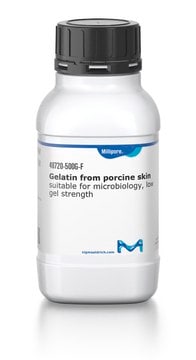Recommended Products
Quality Level
form
powder
autoignition temp.
698 °F
concentration
48.0-49.5 % (w/w) (ethoxyl)
color
white
refractive index
n20/D 1.47 (lit.)
viscosity
7-15 mPa.s, 6 % in toluene/ethanol 80:20(25 °C)
density
1.14 g/mL at 25 °C (lit.)
storage temp.
room temp
Looking for similar products? Visit Product Comparison Guide
Application
Ethyl cellulose is generated by converting a variable number of hydroxyl groups on the repeating glucose units to ethyl ether groups. Ethylcellulose is used in the preparation of biostructures such as matrices, microspheres, microparticles, pellets and tablets for use in drug delivery.
Preparation Note
Ethyl Cellulose is soluble in a wide range of solvents such as aliphatic alcohols, chlorinated solvents, and natural oils. It is insoluble in water, glycerin, and prolylene glycol.
Other Notes
To gain a comprehensive understanding of our extensive range of Polysaccharides for your research, we encourage you to visit our Carbohydrates Category page.
Storage Class Code
11 - Combustible Solids
WGK
WGK 1
Flash Point(F)
Not applicable
Flash Point(C)
Not applicable
Personal Protective Equipment
dust mask type N95 (US), Eyeshields, Gloves
Certificates of Analysis (COA)
Search for Certificates of Analysis (COA) by entering the products Lot/Batch Number. Lot and Batch Numbers can be found on a product’s label following the words ‘Lot’ or ‘Batch’.
Already Own This Product?
Find documentation for the products that you have recently purchased in the Document Library.
Customers Also Viewed
Xianfeng Gao et al.
Physical chemistry chemical physics : PCCP, 19(7), 4956-4961 (2017-02-06)
The electron transport layer (ETL) plays a critical role in high efficiency perovskite solar cells. In this study, an anodic TiO
Avi Schneider et al.
Proceedings of the National Academy of Sciences of the United States of America, 117(49), 31010-31017 (2020-11-25)
Perovskite solar cells have developed into a promising branch of renewable energy. A combination of feasible manufacturing and renewable modules can offer an attractive advancement to this field. Herein, a screen-printed three-layered all-nanoparticle network was developed as a rigid framework
Francisco Flores-Céspedes et al.
Journal of agricultural and food chemistry, 60(4), 1042-1051 (2012-01-10)
Imidacloprid, a systemic insecticide that has a water solubility of 610 mg L(-1), has been formulated in lignin-polyethylene glycol matrices by a melting process. This formulation was coated in a Wurster type fluidized-bed equipment using ethylcellulose and dibutyl sebacate. Imidacloprid
Amelia M Avachat et al.
Acta pharmaceutica (Zagreb, Croatia), 61(4), 363-376 (2011-12-29)
An emulsion solvent evaporation method was employed to prepare microspheres of ropinirole hydrochloride, a highly water soluble drug, by using ethylcellulose and PEG with the help of 32 full factorial design. The microspheres were made by incorporating the drug in
Yutaka Okuda et al.
International journal of pharmaceutics, 423(2), 351-359 (2011-12-06)
The aim of this study is to design a new orally disintegrating tablet (ODT) containing micronized ethylcellulose (MEC). The new ODT was prepared by physical mixing of rapidly disintegrating granules (RDGs) with MEC. To obtain RDGs, mannitol was spray-coated with
Our team of scientists has experience in all areas of research including Life Science, Material Science, Chemical Synthesis, Chromatography, Analytical and many others.
Contact Technical Service




